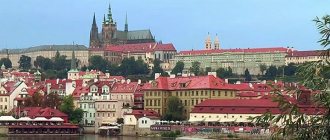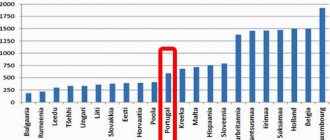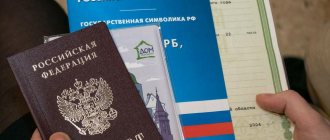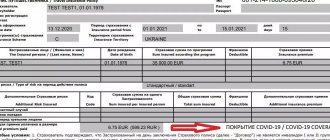TRKI exam: who needs it and why?
Any foreigner can take the Test of Russian as a Foreign Language (TRFL) and receive a certificate of language proficiency. The test was developed in 1995 by professors from four universities: Moscow State University, RUDN University, Pushkin Institute and St. Petersburg State University. These are the universities that issue certificates, but to take the exam you can contact the nearest accredited center. They are in different cities of Russia and even in other countries.
Levels of Russian proficiency
TRFL allows you to identify your level of Russian language proficiency. There are 6 levels in total, but only 4 of them are certification levels.
A1 - elementary level. Having command of the language at this level, a foreigner can read simple texts, understand advertisements and banners. Can participate in dialogue and answer questions. Talk about yourself, your friends, family and free time. The lexical minimum is 780 words.
A2 - basic level. Foreigners who know the language at a basic level can carry out more complex conversations, read texts and understand not only basic but also additional information. They can also fill out questionnaires and forms. The lexical minimum is 1,300 words. A certificate of knowledge of Russian at level A2 is sufficient to obtain citizenship.
A certificate of completion of the TRFL will definitely be useful to philology students and journalists. Photo: pexels.com
B1 is the first certification level. Foreigners must read and understand literary and journalistic texts, maintain dialogues on a wide range of topics, and be able to formulate and express their own opinions based on the texts they have read and heard. The lexical minimum is 2,300 words.
B2 is the second certification level. Those who speak Russian at this level read journalistic and artistic texts with elements of reasoning and a pronounced author’s assessment. They can start a dialogue themselves, freely express and defend their opinions during the conversation. The lexical minimum is 10,000 words.
C1 is the third certification level. This level allows you to read and understand highly specialized texts and freely discuss philosophical topics. The lexical minimum is 12,000 words. Foreigners must know the language at level C1 in order to receive a diploma at a Russian university or work as a philologist, journalist, editor, or translator.
C2 is the fourth certification level. It is close to the level of native speakers. To receive a C2 certificate, a foreigner must be able to communicate freely on any topic and construct sentences competently and logically, both in writing and orally. The lexical minimum is 15,000 words. Language proficiency at the C2 level is necessary for foreigners who want to conduct teaching or scientific activities in the field of the Russian language.
Learning Difficulties
Foreigners who take up the Russian language have to learn many rules, synonyms and exceptions. In Russian there is no established word order; the subject and predicate can be swapped, and this will not be an error, but because of this, the meaning of the entire sentence may change. All emerging difficulties can be divided into several groups.
Alphabet
The main difficulty of the Russian alphabet is that many peoples of the world are accustomed to the Latin spelling of words. Therefore, when foreigners encounter the Cyrillic alphabet, difficulties arise. It is more difficult - as many as 33 letters , a large number of sounds do not coincide with the letter part.
Pronunciation
When studying the phonetics of the Russian language, foreigners have to master new sounds that are absent in their native language. For example, it is difficult to pronounce the sound [И] , the combination [ОО] is difficult to pronounce for foreigners. For example, "Pacific" .
The stress in the Russian language is mobile, not assigned to a specific syllable of a word, so it is difficult for foreigners to remember where to place it. For example, in Latvian and Czech the stress is always placed on the first syllable.
Grammar
The grammar is complicated because in Russian there are 6 cases of each noun and adjective. For example, “chair - chair, chair, chair, chairs...” . There are perfective and imperfective verbs, the endings of which change depending on tense and gender. And the variety of participles, gerunds and verbal adjectives can “break the brain” of any foreigner.
The complexity of the Russian language consists of the alphabet, pronunciation and grammar. PHOTO: UNSPLASH.COM
Exam structure
The exam consists of five subtests. The difficulty of the tasks depends on the level. We will talk in detail about the questions for the first certification level B1.
Vocabulary/grammar
This subtest includes 165 items. It allows you to check how well you know cases, verb forms, tenses and numbers. Below we provide examples of four typical questions from the test.
Time is Up!
Reading
The section consists of three texts with 20 questions. Texts can be very different - biographies, encyclopedic passages, excerpts from a guidebook. You are allowed to use a dictionary when completing assignments.
Listening
You will be asked to listen to 6 short texts, and then complete 30 tasks for them. The texts will be in different formats: everyday dialogues, excerpts from TV shows, fragments of lectures.
Letter
The section consists of two tasks. First, you must read the text, answer the question in detail and express your opinion on the proposed topic. Then you are asked to write a letter of at least 20 sentences. To make the task easier, you will be offered a list of questions to answer.
Speaking
The “Speaking” subtest includes 4 tasks. The first and second are performed immediately, to prepare for the third and fourth, you will be given a few minutes.
The first is participation in dialogues. The examiner will ask you questions that you need to answer quickly. Only detailed answers are counted; you cannot simply say “yes”, “no”, “I don’t know”.
During the second task, you will need to independently start dialogues on the proposed topics. There will be 5 of them.
In the third task you need to read the text, briefly retell it and answer 2 questions about it.
In the last task you will be asked to prepare a message on a specific topic. You will be given time to make a plan and prepare to respond. It must contain at least 20 replicas.
While completing the third and fourth tasks, you can use a dictionary.
Where to go to take the exam?
The exam is taken only in accredited centers. They are located throughout Russia, in the USA and several countries in Europe and the CIS.
List of head centers where you can take the exam in Russian as a foreign language
Each center independently sets the cost of the exam, and it also depends on the level - the higher it is, the more expensive the testing costs. For example, the price of testing for level A2, which is required for citizenship, ranges from 3,000 to 6,000 rubles. But the cost of testing C2 can reach 8,000 rubles.
Who needs a certificate
If you have a residence permit in Russia, a permanent legal income and have renounced your existing citizenship of another country, then you have the opportunity to apply for citizenship of the Russian Federation on a general basis.
In this case, you attach confirmation of your level of Russian language proficiency to the documents submitted to the Department of Migration Affairs of the Ministry of Internal Affairs. It could be:
- certificate of passing state testing in Russian as a foreign language;
- a document on education (not lower than basic general education) or a document on education and qualifications of the established form, issued by an organization carrying out educational activities, before September 1, 1991 on the territory of the USSR, after September 1, 1991 on the territory of the Russian Federation;
- a document issued on the territory of a foreign state to its citizen, where Russian is the second state language (for example, the Republic of Belarus).
The following are exempt from submitting documents confirming knowledge of the Russian language:
- women over 60 years of age and men over 65 years of age;
- disabled people of group 1;
- persons declared incompetent;
- persons who have special services to the Russian Federation.
The following have the right to obtain citizenship of the Russian Federation in a simplified manner and without confirmation of proficiency in the Russian language:
- persons recognized as native speakers (the decision is issued to a foreign citizen and stateless person permanently residing legally on the territory of the Russian Federation, based on the conclusion of the appointed commission);
- WWII veterans who had USSR citizenship and lived in Russia;
- a child and an incapacitated person who is a foreign citizen or stateless person:
- at the request of a parent - a citizen of the Russian Federation, with the consent of the other parent, if the child lives outside the Russian Federation;
- at the request of the only parent - a citizen of the Russian Federation;
- at the request of a guardian, trustee of a child or an incapacitated person who has Russian citizenship, except in cases provided for by Federal Law No. 48-FZ of April 24, 2008 “On Guardianship and Trusteeship”;
- participants of the State program to assist the voluntary resettlement of compatriots living abroad to the Russian Federation.
Video: about a simplified scheme for obtaining Russian citizenship
It is worth noting that only a few individuals receive Russian citizenship under a simplified scheme or are exempt from confirming Russian language proficiency. Therefore, an important step in obtaining a Russian passport is the test in Russian as a foreign language (TRKI certificate), which confirms confident knowledge of the Russian language.
How is testing done?
First of all, choose the center where you will take the test. You can see the exam schedule on its official website. Be sure to check if pre-registration .
Almost everywhere the exam lasts 2 days. In the first you take “Writing”, “Vocabulary”. Grammar" and "Reading", in the second - "Listening" and "Speaking".
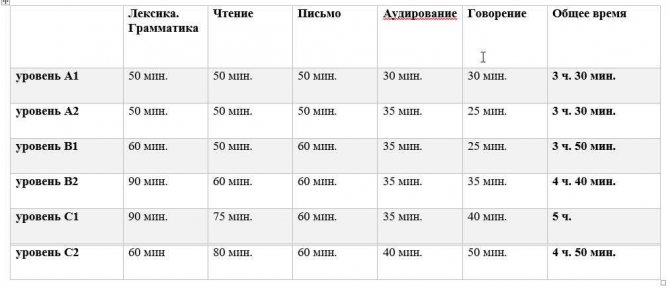
The duration of the TRFL depends on the level
Be sure to take your passport and two pens with you to the exam, pay for the test in advance and don’t forget your receipt. Check with your chosen center to see what other documents they may require from you.
The test results will be communicated to you within two weeks, often they become known within 3-4 days. Upon successful completion, a permanent certificate of proficiency in Russian is issued. To obtain it, you must correctly complete 66% of the tasks in each section. If you score less on one of the subtests, you can retake it for half the cost.
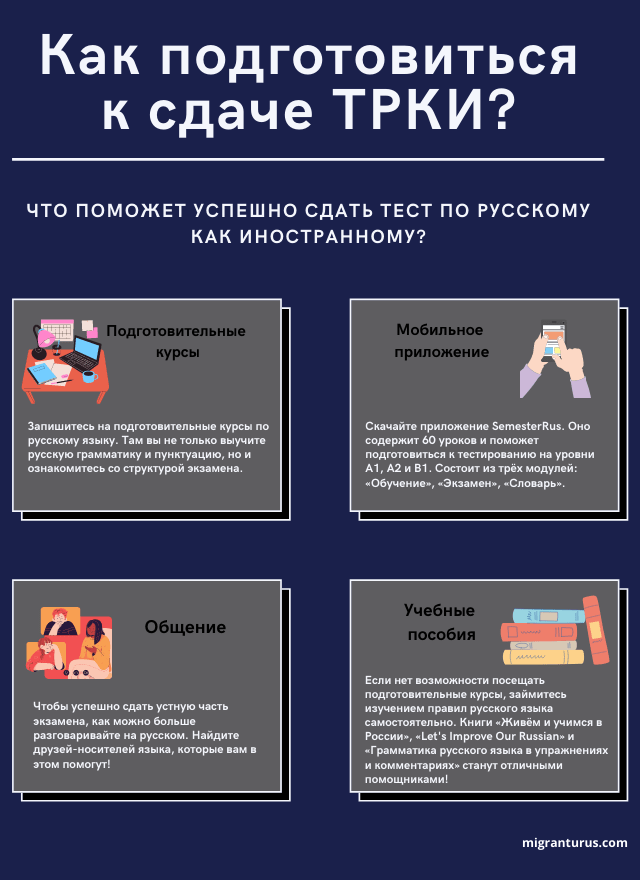
Tips for preparing for Russian language testing
Tips for passing the exam
- Before the exam, listen to the instructions carefully.
- If you are unable to read assignments due to poor print quality, be sure to inform your examiner.
- Turn off your mobile phone and do not take it out during the exam.
- Do not distract other participants by talking.
- Bring a bottle of water and chocolate with you.
- If you become ill during the exam, please inform your invigilators.
Subscribe to Migranta Rus: Yandex News.
Tips for beginners to learn Russian
When starting to study Russian, a foreigner gets lost among the many facets and components of the language. He doesn't know what to grab onto. Here are tips for those who want to successfully master Russian:
Learn words
Don't focus on grammar, it will only confuse you.
Learn more words, or even better, memorize entire phrases, understand in what context they should be used. To do this, read more books and articles, retell them out loud. Write down new words in a dictionary, make cards for memorization. Learn not individual words, but entire phrases! Photo: unsplash.com
Talk
Talk to your Russian-speaking friends. This way you will study modern colloquial speech. The more you speak, the faster you will master the language. If you don’t have friends who speak Russian yet, now is the time to make them. You can not only communicate in person; talking on the phone or Skype is enough. Also correspond with native Russian speakers in chat rooms or social networks. For example, the VKontakte network is popular among the Russian population.
Immerse yourself in the atmosphere of the language
Watch TV shows and movies, listen to music in Russian, read about the culture and traditions of the country, subscribe to Russian-speaking bloggers - surround yourself with the Russian language. By immersing yourself in the atmosphere of the language, you will understand and feel it faster. Good luck to you!


